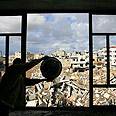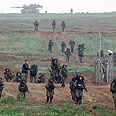
Destruction from Gaza op
Photo: AP

Soldiers return from Gaza
Photo: Reuters
Soldiers say received orders to shoot first, worry later in Gaza war
Breaking the Silence activist group presents report of testimonies from Gaza offensive in which soldiers say destruction, civilian casualties were direct result of IDF policy. Army: Testimonies are general, anonymous, and unreliable
A number of IDF soldiers who took part in Israel's recent Gaza offensive say
they were urged by commanders to shoot first and worry later about sorting out civilians from combatants. Accordingly, they say, the force went into Gaza with guns blazing.
"Better hit an innocent than hesitate to target an enemy," is a typical description by one unidentified soldier of his understanding of instructions repeated at pre-invasion briefings and during the 22-day operation, from Dec. 27 to Jan. 18.
In print and video testimony published on Wednesday by the activist group Breaking the Silence, the 30 soldiers say the army's imperative was to minimize its own casualties to ensure Israeli public support for the operation.
Old News: Report from Gaza
Aviad Glickman
Seven Israeli human rights groups file complaint with military advocate general chief, attorney general regarding what they describe as IDF's 'inhumane, appalling treatment' of Palestinian detainees during Gaza op
"If you're not sure, kill. Fire power was insane. We went in and the booms were just mad," says another. "The minute we got to our starting line, we simply began to fire at suspect places. In urban warfare, anyone is your enemy. No innocents."
The 112-page report by Breaking the Silence includes testimonies of 30 soldiers "who served in all sectors of the operation".
"The majority ... are still serving in their regular military units and turned to us in deep distress at the moral deterioration of the IDF," it says. Their narratives "are enough to bring into question the credibility of the official IDF versions".
Except for a sergeant named Amir, the soldiers are anonymous and their faces digitally blurred. The group said it had funding from Israeli human rights groups and the governments of Britain, the Netherlands and Spain, and from the European Union.
"We believe that the existence of a moral society clearly requires a profound, honest discussion, of which the voice of soldiers on the ground is an inseparable part," the group says.
Soldiers describe a "Neighbor Procedure" in which civilians were forced to enter suspect buildings ahead of troops. They cite cases of civilians advancing in front of a soldier resting his rifle on their shoulder.
The report repeats charges denied by Israel that white phosphorus was fired indiscriminately into Gaza streets. It cites "massive destruction was unrelated to any direct threat to Israeli forces" and "permissive" rules of engagement.
"We did not get instructions to shoot at anything that moved," says one soldier. "But we were generally instructed: if you feel threatened, shoot. They kept repeating to us that this is war and in war opening fire is not restricted."
The report also mentions armored bulldozers razing whole areas including gardens, and olive and orange groves. "We didn't see a single house that was intact ... that was not hit. The entire infrastructure, tracks, fields, roads, was in total ruin. The D-9 (bulldozer) had gone over everything," the report quotes a soldier as saying.
"There was a clear feeling, and this was repeated whenever others spoke to us, that no humanitarian consideration played any role in the army at present. The goal was to carry out an operation with the least possible casualties for the army."
IDF: Soldiers should come forth
The testimonies challenge assertions by Israeli officials and pro-Israel groups in the United States that "Israel did all it could to avoid civilian casualties", as Kenneth Jacobson of the Anti-Defamation League wrote last week to the New York Times.
The League denounced Amnesty International for labeling Israel's actions as "wanton" destruction and said it was "outrageously accusing the Israeli military of war crimes".
Defense Minister Ehud Barak asserted after the war that Israel had the most moral army in the world. These critics say Israelis should not be asked simply to accept that their army's conduct was "faultless and public accountability uncalled for".
The IDF, Breaking the Silence said in the preamble to its evidence, went to great lengths to prove that if there were any excesses they were by the "delinquent soldier".
The testimony suggests that "the massive and unprecedented blow to the infrastructure and civilians of the Gaza Strip was a direct result of IDF policy".
The IDF Spokesperson's Office stated in response that the army "regrets the fact that a human rights organization is presenting to Israel and the world, once again, a report containing general and anonymous testimonies without ascertaining their details or reliability and without allowing the IDF, with minimal fairness, a chance to probe the affairs and respond prior to their publication".
The statement adds that the IDF "believes Breaking the Silence should encourage testifiers to break their silence and present specific claims in order for it to be possible to deal with the claims properly and investigate them, and not to hide behind anonymous testimonies".
The army also stated that the Gaza offensive was a "no other choice operation" and that five different probes had already been authorized regarding the IDF's conduct in Gaza. "The IDF is committed to investigating any complaint", the statement says.
A Palestinian rights group has stated that 1,417 people were killed, 926 of them civilians, during Operation Cast Lead. But the army has put the death toll at 1,166 and estimated 295 dead were civilians. Ten IDF soldiers and three Israeli civilians were also killed.















